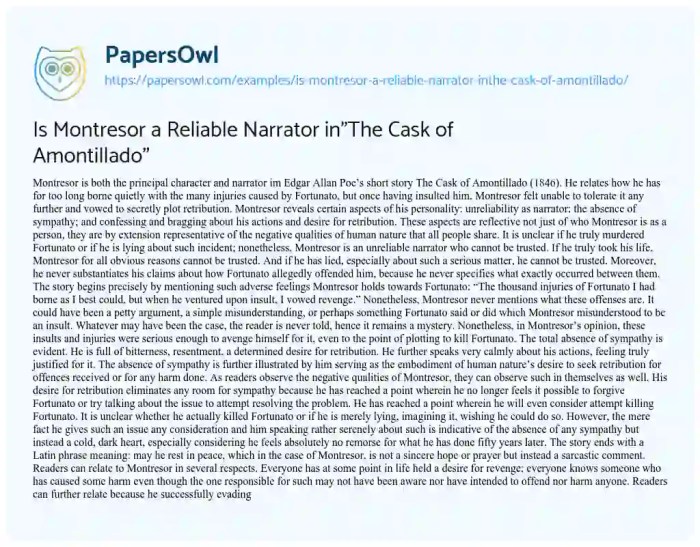Is Montresor a reliable narrator? This question lies at the heart of Edgar Allan Poe’s haunting tale, “The Cask of Amontillado.” Montresor’s chilling account of his revenge against Fortunato raises doubts about his trustworthiness, inviting readers to question the very nature of truth and perception.
As we delve into Montresor’s narrative, we must consider his motives, biases, and the psychological factors that shape his perspective. The story’s historical and social context also plays a crucial role in understanding Montresor’s actions and the reliability of his account.
Reliability of Montresor’s Account

In Edgar Allan Poe’s “The Cask of Amontillado,” Montresor, the narrator, presents a seemingly straightforward account of his revenge against Fortunato. However, upon closer examination, his reliability as a narrator becomes questionable.
Evidence Supporting Montresor’s Reliability
- Consistency:Montresor’s story maintains a logical and coherent structure, with no glaring contradictions or inconsistencies.
- Attention to Detail:Montresor provides intricate details about the setting, characters, and events, suggesting an accurate memory.
- Internal Corroboration:Montresor’s account is partially corroborated by the presence of the bones in the catacombs, which suggests the truthfulness of his story.
Instances of Bias and Unreliability
- Subjectivity:Montresor’s perspective is heavily biased, as he presents Fortunato in an entirely negative light and portrays himself as justified in his actions.
- Omissions:Montresor omits key details, such as the nature of the insult that prompted his revenge, raising questions about his motives.
- Lack of Remorse:Montresor shows no remorse for his actions, even after entombing Fortunato alive, suggesting a lack of moral accountability.
Montresor’s Motives and Influence on Narration
Montresor’s motives for seeking revenge are complex and unclear. His own account suggests a history of conflict with Fortunato, but the exact nature of their feud remains unknown. This ambiguity casts doubt on the reliability of Montresor’s portrayal of Fortunato as a malicious and deserving victim.
Montresor’s strong emotions and desire for vengeance likely influenced his narration. His subjectivity may have led him to exaggerate Fortunato’s flaws and minimize his own culpability.
Montresor’s Perspective

Montresor, the narrator of “The Cask of Amontillado,” is a complex and enigmatic figure whose perspective shapes the events of the story. His character traits, family history, and psychological state all contribute to his unreliable and biased account of the events that transpire.
Character Traits
Montresor is a proud and arrogant man, convinced of his own superiority and entitlement. He views himself as a member of an ancient and noble family, and he is deeply offended by Fortunato’s perceived insults and disrespect. Montresor’s pride and arrogance lead him to seek revenge against Fortunato, and they also blind him to the moral implications of his actions.
Family History
Montresor’s family history plays a significant role in shaping his perspective. The Montresor family has a long and storied history, and Montresor is deeply proud of his heritage. He believes that his family is superior to others, and he is determined to uphold the family honor.
Montresor’s family history gives him a sense of entitlement and privilege, and it also contributes to his arrogance and pride.
Psychological Factors
Montresor’s psychological state is also a factor in his unreliable narration. He is a deeply disturbed individual, and his behavior is often irrational and unpredictable. Montresor is obsessed with revenge, and he is willing to go to any lengths to achieve it.
His obsession with revenge blinds him to the moral implications of his actions, and it also makes him unable to see the error of his ways.
Contextual Influences

The historical and social context of Edgar Allan Poe’s “The Cask of Amontillado” greatly influences the story’s events and characters. Set in the 19th century, the tale reflects the cultural norms and values of the time, including the prevalence of revenge and retribution.
Social Norms and Values
During the 19th century, social norms dictated strict adherence to codes of honor and etiquette. Individuals were expected to uphold their reputations and avenge any perceived insults or slights. This cultural emphasis on honor and revenge influenced Montresor’s actions, as he sought to punish Fortunato for an unspecified offense.
Role of Revenge and Retribution
Revenge and retribution were deeply ingrained in the society depicted in “The Cask of Amontillado.” The concept of “an eye for an eye” was widely accepted, and individuals often resorted to violence to settle disputes. Montresor’s elaborate plan to murder Fortunato exemplifies the extreme lengths to which individuals would go to exact revenge.
Literary Techniques

Edgar Allan Poe employs several literary devices in “The Cask of Amontillado” to create a sense of unreliability and heighten the reader’s uncertainty about Montresor’s account.
Foreshadowing
Poe uses foreshadowing to hint at the sinister events to come. For example, Montresor’s description of the catacombs as “a place of the dead” and his reference to the “rank fetus-like odor” suggest that something macabre will transpire.
Symbolism, Is montresor a reliable narrator
The story is rich in symbolism. The catacombs, for instance, represent the depths of Montresor’s malice and the darkness that consumes him. The cask of Amontillado symbolizes the trap that Montresor sets for Fortunato.
Irony
Poe also uses irony to create a sense of unease. For example, Montresor claims to be Fortunato’s friend, but his actions reveal his true intentions. The story’s title, “The Cask of Amontillado,” is also ironic, as it suggests a festive occasion, but the cask ultimately becomes Fortunato’s tomb.
First-Person Perspective
The story is narrated from Montresor’s first-person perspective, which allows the reader to experience the events through his eyes. However, this perspective also limits the reader’s understanding, as they are only privy to Montresor’s version of events.
Critical Reception: Is Montresor A Reliable Narrator

Critical reception of Montresor as a narrator has varied over time, with different interpretations of his reliability and the implications for the story.
Initially, Montresor was often seen as a reliable narrator, as his account of the events is logical and consistent. However, as critics began to examine the story more closely, they began to question Montresor’s reliability, noting his obvious bias against Fortunato and his tendency to exaggerate and distort the events.
Modern Interpretations
Modern interpretations of Montresor’s reliability have become even more varied. Some critics argue that Montresor is completely unreliable, and that his account of the events is a complete fabrication. Others argue that Montresor is partially reliable, and that his account of the events is essentially true, but that he has exaggerated and distorted certain details.
Question & Answer Hub
What evidence suggests Montresor is an unreliable narrator?
Montresor’s account is marked by inconsistencies, omissions, and a clear bias against Fortunato, raising doubts about his objectivity and honesty.
How does Montresor’s family history influence his perspective?
Montresor’s family has a history of feuding with the Fortunatos, which likely fuels his desire for revenge and colors his perception of events.
What literary devices does Poe use to create a sense of unreliability?
Poe employs foreshadowing, symbolism, and irony to subtly undermine Montresor’s credibility and create a sense of doubt and ambiguity.